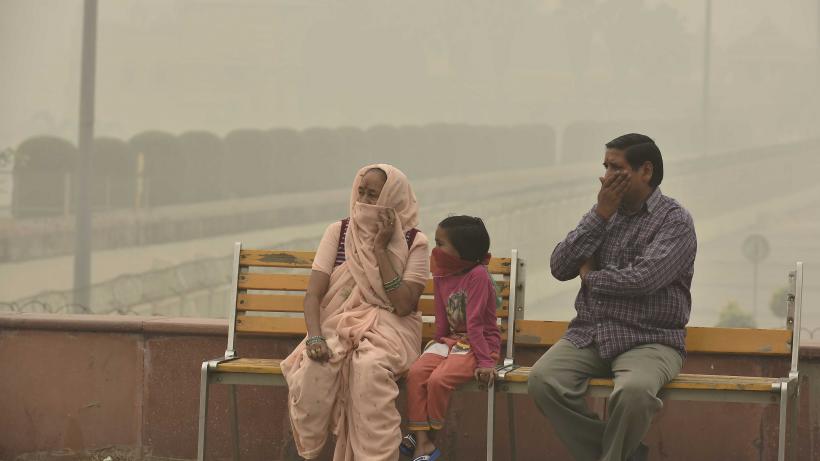
Innovative regulations to reduce pollution
Industrialisation is generating high levels of pollution that is worsening poverty and inequality. While environmental regulation is one obvious policy tool that can curb pollution, it is often difficult to enforce. Our research has found that inducing firms to be more transparent about how much they pollute could improve the effectiveness of regulations, thereby reducing pollution.
What is the challenge?
While industrialisation has generated rapid economic growth and raised living standards in the two most populous countries, China and India, it has also led to unprecedented levels of pollution. According to the World Health Organisation, Indian cities make up nine of the world’s top ten most polluted cities, as measured by particulate matter (PM) concentration -- specially measured by fine particles with a diameter of 2.5 micrometers or less (PM2.5). While air pollution is regulated at the national level and enforced at the state level, India has a history of heavy-handed industrial regulations, and many now worry that environmental regulations have replaced onerous licensing and labour regulations that have previously impeded growth.
Addressing the problem
Innovative and transparent environmental regulations could help protect the environment without hampering economic growth. IGC studies have examined the impact of such regulations in different Indian states including incentives for environmental auditors, emissions monitoring systems, emissions trading, and rating firms based on emission levels.
Research results
- Environmental auditors are typically not incentivised to report pollution emissions accurately. A randomised experiment in Gujarat (Duflo et al., 2013, "Truth-telling by Third-party Auditors and the Response of Polluting Firms: Experimental Evidence from India", The Quarterly Journal of Economics) sought to change the incentive structure for environmental auditors, who are typically chosen and paid by the firms they audit – a potential conflict of interest. Results show that the existing auditing system was corrupted: auditors reported only 7% of plants violated the regulatory standard, while the actual proportion was 59% of plants were emitting above the standard.
- Changing the incentives for auditors can improve the accuracy of their reporting. The study randomly assigned auditors to firms, paid auditors from a central pool of funds rather than by the plant, and back-checked each auditor’s reports. As a result, auditors were 80% less likely to falsely report an emissions reading as being compliant with the regulatory standard, and their readings were 50–70% higher than those of auditors working in the regular system.
- More accurate information on polluting firms can lead them to reduce emissions. The plants receiving the intervention reduced their emissions (by an average of 0.21 standard deviations). These reductions all came from the highest polluting plants, i.e., those facing the biggest risk of being penalised for violating regulations. The findings suggest incentives for auditors can improve the accuracy of their reporting and in turn, increase the effectiveness of environmental regulations.
- Rating firms on their emission levels could help reduce air pollution. IGC researchers are currently working with the Maharashtra Pollution Control Board (MPCB) to evaluate the impact of a ‘star-rating’ programme that rates large industrial plants on their air pollution emissions – the first of its kind in India. The study assigns random groups of plants to have their ratings shared only within the plant or shared with the public, to compare how own-knowledge and public pressure affect emissions.
Impact on policy
The Gujarat State Pollution Control Board issued new guidelines on environmental auditing based on the findings of the IGC’s audit study in January 2015. The improved audit system 1) randomly assigns auditors to firms, 2) eliminates negotiation between auditors and firms on their fees, by paying auditors from a central pool and/or having fixed fees based on the work needed, and 3) introduces random checks of auditors’ reports by independent technical staff.
The evaluation of the MPCB Star Rating Program is ongoing and recently expanded from 79 industries to cover 269 industries.
- Does improved regulatory enforcement reduce industrial pollution? An evaluation of public and private sector approaches
Esther Duflo, Michael Greenstone, Rohini Pande, and Nicholas Ryan
- Clearing the air: The effects of transparency on plant pollution emissions
Michael Greenstone, Rohini Pande, Nicholas Ryan, and Anant Sudarshan
- Building environmental regulation that enables growth
Michael Greenstone, Rohini Pande, Nicholas Ryan, and Anant Sudarshan
- Emissions trading as an environmental innovation in India: Measuring the policy impact on emissions and abatement costs
Michael Greenstone, Rohini Pande, Nicholas Ryan, and Anant Sudarshan
- Blog -- Star power: Maharashtra starts rating industries by emissions

